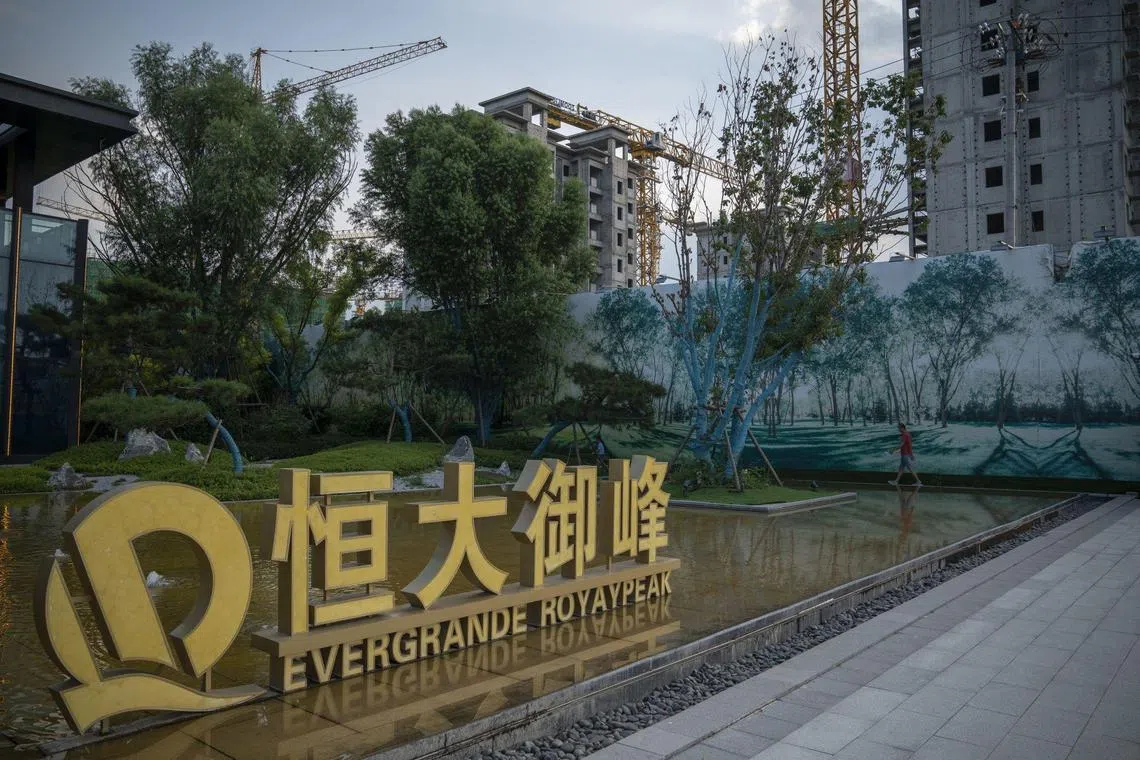Evergrande debt revamp plan fails to cheer investors, property stocks
Sign up now: Get ST's newsletters delivered to your inbox

The debt restructuring proposal has a long repayment period and lacks enough sweeteners, creditors and analysts said.
Bloomberg
HONG KONG – China Evergrande Group’s debt restructuring proposal – a test of investor sentiment towards the battered property sector – failed to impress because of its long repayment period and lack of enough sweeteners, creditors and analysts said.
Evergrande is the world’s most indebted developer, with around US$300 billion (S$397.3 billion) in liabilities. Its debt restructuring, the country’s biggest such exercise, is aimed at saving it from a disorderly collapse.
The developer has US$22.7 billion of offshore debt, all of which is deemed to be in default. The plan provided two main options to its dollar bond holders to recoup their investments.
Creditors can either swap all of their holdings into new notes with maturities of 10 to 12 years, or convert them into different combinations of new notes with tenors of five to nine years and equity-linked instruments.
Bond holders of notes issued by Evergrande’s offshore units will also be allowed to exchange their existing debt for new notes, which will start paying coupons from the fourth year after issuance.
The outcome of Evergrande’s debt revamp plan is likely to have a bearing on similar proposals being worked on by a string of other Chinese developers that have defaulted on repayment obligations in the last year.
An index tracking mainland-based property developers slipped 0.5 per cent in early afternoon trading on Thursday, while the broader stock benchmark index added 1.3 per cent. Trading in Evergrande shares remains suspended.
“Overall, we are not very satisfied with it, since there is no more credit enhancement and the new tenors are too long,” Mr Sunny Jiang, head of fixed income investment at Haitong International Asset Management, said of the Evergrande plan.
“If this plan gets passed, we worry it might set a bad example for other developers mulling over their restructuring proposals, and it might be even more challenging for bond holders to recoup their investment,” he added.
Lack of funding
Some bond holders have been pushing Evergrande to sweeten the deal with domestic assets, but Wednesday’s proposals did not include such terms.
A dollar bond holder, who was not authorised to speak to the media, likened the debt restructuring plan to lending a bucket of rice to someone and being repaid with two grains a year.
Another creditor said the plan was built on assumptions, including that Evergrande and its two Hong Kong-listed units could resume trading and sustain their businesses despite funding woes.
Evergrande said on Wednesday that additional financing of 250 billion yuan (S$48.5 billion) to 300 billion yuan would be required as it resumes operations over the next three years.
China Evergrande New Energy Vehicle Group said on Thursday that it might have to halt production of electric vehicles if it could not obtain fresh funding.
If Evergrande fails to push ahead with its restructuring plan, the developer may have to face liquidation proceedings filed by an investor in one of its units in a Hong Kong court.
A representative of Evergrande’s winding-up petitioner, Top Shine Global, told Reuters on Thursday that the investment firm was still studying the proposal to see if it would support the plan or continue to push ahead with the liquidation request.
Evergrande, however, citing an analysis it commissioned, said the recovery for offshore creditors in a groupwide liquidation was expected to be less than US$1.5 billion, a rate of 2.1 per cent to 9.3 per cent depending on the type of debt held.
Creditors might have to accept the plan for what it is, Mr David Blennerhassett, a Quiddity Advisors analyst who publishes on Smartkarma, told Reuters, adding that it was too early to speculate that the worst was over for Evergrande. REUTERS


